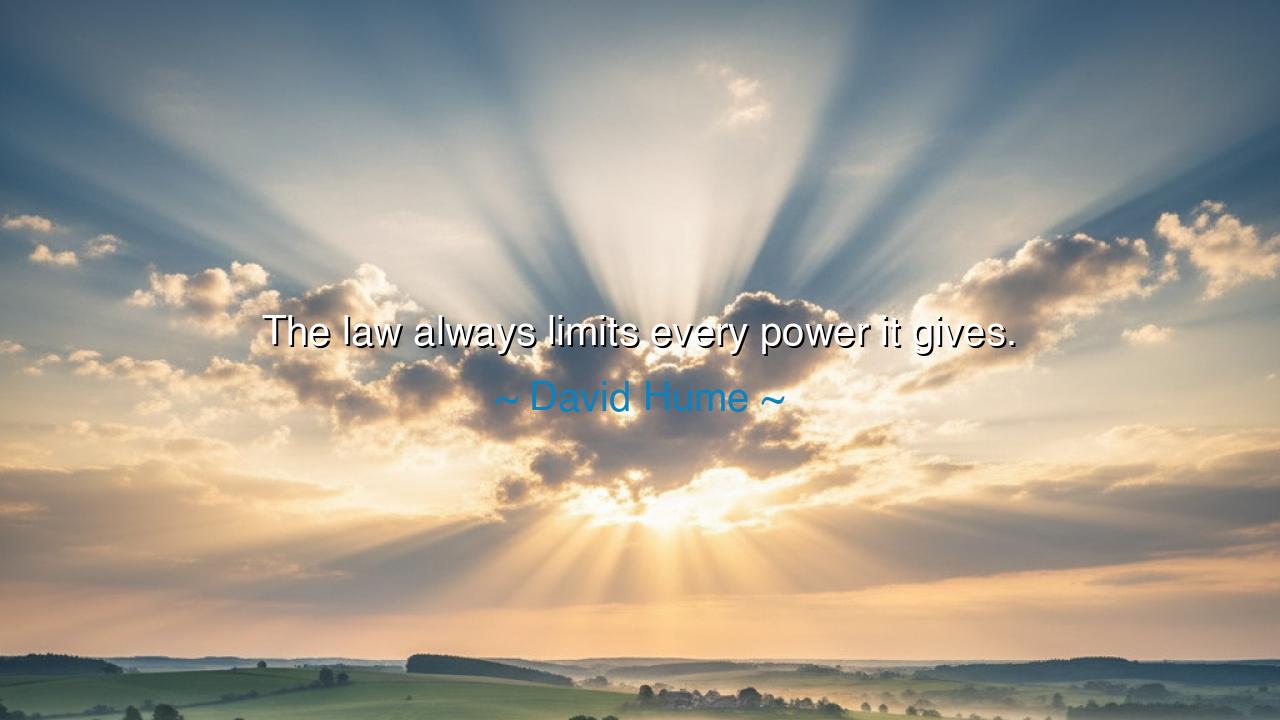
The law always limits every power it gives.






The words of David Hume strike with the precision of a philosopher and the gravity of a sage: “The law always limits every power it gives.” In this brief truth, he reveals the double edge of authority. For though the law grants strength, it also sets boundaries; though it empowers rulers, it binds them; though it grants rights, it restrains their misuse. Thus, every gift of power is a covenant—never absolute, but always balanced by restraint.
The law is a harness placed upon the wild horse of human will. Without it, the strong devour the weak, and chaos reigns. With it, order arises, but not without limits. For in granting kings the right to rule, the law binds them to justice. In granting citizens their freedom, it binds them not to abuse it to the harm of others. Hume’s wisdom shows that power and limitation are twins, inseparable, for one without the other destroys itself.
History gives us living examples. When Magna Carta was signed in 1215, it granted the English king certain rights, but at the same time, it curbed his authority by declaring that even the sovereign was not above the law. This moment, though born of strife, became a foundation of liberty: the recognition that every power given must be matched by a boundary that secures justice for all. Without such restraint, monarchy would have consumed its people; with it, the seeds of constitutional rule were sown.
Hume’s words also speak to personal life. The freedom of speech is a mighty power, yet it is limited by the law against slander or incitement. The freedom of property is a sacred gift, yet it is bound by the duty not to steal or defraud. In every society, rights and restrictions intertwine like warp and weft, creating a fabric strong enough to cover all. To forget this is to mistake liberty for license, and power for tyranny.
Therefore, let this wisdom be handed down: do not curse the limits of the law, for they are the guardians of the gifts it bestows. Every power unchecked is destruction; every liberty without boundary devours itself. Hume’s teaching is both warning and guide—that in the balance of grant and restraint lies the true genius of civilization. He speaks across the centuries: remember always that the law, in binding, also preserves, and in limiting, it makes possible the blessings it gives.






VTLai Viet Tien
This observation feels timeless. It reminds me that every legal authority, from governments to institutions, operates under built-in checks. Yet, I can’t help but question whether modern laws still uphold this principle. In an era of loopholes and political manipulation, do laws truly limit power, or have they become tools for those already in control? Maybe Hume’s insight serves more as a warning than a reassurance.
MTPham Minh Tiep
What I love about this quote is its simplicity—it captures a profound truth about how systems function. The moment a power is granted, it carries the seed of its own restriction. But I’m curious—does that mean true freedom is impossible within law? Or does the structure itself create the conditions for real freedom by preventing chaos? It’s such a paradoxical relationship between order and liberty.
CPChien Phan
I find this statement incredibly relevant today, especially with debates about government surveillance, corporate regulation, and free speech. Every time we grant authority to protect us, we also accept boundaries on our freedom. It raises a tough question: how do we decide which limitations are justified and which are oppressive? Maybe the real challenge isn’t writing laws, but ensuring the balance of power remains fair over time.
TLTieen L
This quote makes me think about how power and limitation are two sides of the same coin. It’s fascinating how the law both empowers and restrains at once. But I wonder—does that balance always work as intended? In practice, it feels like those with greater influence often find ways to bypass the limits meant to contain them. Is Hume describing an ideal principle, or a reality that rarely holds true?